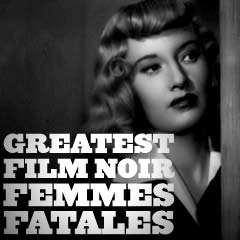
|
|
(chronological by film title) Introduction | Picture Guide | 1941 | 1944 | 1945 | 1946-1 | 1946-2 | 1947-1 | 1947-2 1948 | 1949 | 1950-1952 | 1953 | 1954-1956 | 1957-1959 |
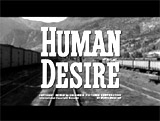
|
Human Desire (1954) (aka The Human Beast)
Fritz Lang's grim, noirish tale of fate, infidelity, deceit, blackmail and obsessive passion was based on Emile Zola's 1890 novel La Bete Humaine. This Columbia Pictures remake was already filmed twice before: the silent film Die Bestie im Menschen (1920, Germ.) and Jean Renoir's French film La Bête Humaine (1938, Fr.) (aka The Human Beast). The film brought together the two main stars of Lang's previous year's classic crime noir The Big Heat (1953) - Glenn Ford and Gloria Grahame, and it was very similar in plot to Lang's Clash by Night (1952). The suspenseful melodrama's tagline described the femme fatale involved in a love-triangle:
In the film's opening, returning Korean War veteran (after three years) and streamliner train brakeman/engineer Jeff Warren (Glenn Ford) was beginning to adjust to life on the homefront and work. He took up his old job at the fictional Central National railroad in New Jersey, hauling passenger trains. He resumed boarding in the home of his co-worker Alec Simmons (Edgar Buchanan). Alec's beautiful, flirtatious, buxom grown-up brunette daughter Ellen (Kathleen Case) caught his eye, and showed off how she was attracted to him. However, Jeff claimed he only wanted a very simple return to ordinary life: "Nothing but a lot of fishing, trains, and for excitement, a big night at the movies."
The assistant railway yardmaster Carl Buckley (Broderick Crawford) was also introduced - he was a violence-prone, moody, brutish and depressed older man. Carl had recently married a trophy wife - no-good femme fatale Vicki Buckley (Gloria Grahame). She was an amoral, erotic, brassy, manipulative and sexually-frustrated, unloved wife. The abusive sloppy drunk could quickly be triggered to show his temper and violent tendencies, and soon enough, was fired from his job for insubordination toward his boss John Thurston (Carl Lee). Vicki offered to work again if they moved east, but he refused ("I don't want my wife working. I didn't marry you so you could take care of me"). The scheming Carl begged his wife Vicki to intervene with influential and powerful businessman John Owens (Grandon Rhodes), who conducted lots of shipping business with the railroad, to restore his job. Owens was the former boss of Vicki's house-keeper mother and a childhood acquaintance. Vicki and Carl took the train to New York City, and while Vicki was away, Carl waited for her. The menacing and domineering Carl suspected that Vicki, who was gone for five hours, had been unfaithful and slept with Owens for the favors she begged for ("What has he got, a private apartment he can drop into for a drink? Is that the bar you went to?"). When she retorted: "Oh, don't paw at me. I'm sick of it, from all of you," he violently threatened to kill her by slapping her and grabbing her. After asking: "You've been making a fool out of me, both of you," he forced her to confess. Then, the black-hearted Carl had her hand-write a message to Owens, who was due to take the night train to Chicago. Vicki requested another rendezvous-meeting with Owens that evening in his sleeping car train compartment:
All of them were on the night train to Chicago, including Jeff who was off-duty and hitching a ride back to New Jersey. When Vicki went to the door of Owens' private drawing room compartment, the insanely-jealous Carl also barged in and murdered him with his pocket-knife. The off-screen stabbing occurred behind the closed compartment door - followed by Carl's hand wiping the blood off the blade onto his coat. To cover up, the crime scene was made to look like a robbery had been committed, by taking Owens' wallet and his pocket-watch - and he also removed Vicki's incriminating message. Jeff became inextricably involved the night of the homicide when he was smoking in the vestibule-corridor between cars near the murder scene. With literal 'blood on his hands,' Carl instructed her to distractedly seduce Jeff so that he could escape unnoticed - and threatened to take the message to the police if Vicki accused him of the lethal stabbing: ("Just get him out of there. And don't get any foolish ideas in your head, Vicki. Remember that letter you wrote"). Vicki befriended Jeff, and successfully led him away. The two went for a drink and conversation in the Club Car, but it was closed, so they opted for a smoke in his empty compartment that ended up with an embrace and a kiss. Jeff was immediately attracted to Vicki. When Carl and Vicki bumped into Jeff while disembarking at their home station, Vicki pretended to meet Jeff for the first time, and he realized she was actually Mrs. Buckley. In their home, Carl burned his blood-stained coat to eliminate evidence, but refused to burn Vicki's message although she begged him to. He threatened to use it on her: "This letter is gonna keep us together. There's not gonna be anybody else, Vicki." During the murder trial inquest, as a witness, Jeff protectively avoided identifying Vicki as the passenger in car # 843 that he saw near Owens' compartment. Later, Jeff was skeptical about Vicki's veracity and confronted her for an explanation. Vicki perjured herself to him when she said that she had visited Owens' compartment alone for a sexual liaison but he was already dead.
He asked why she wasn't more distressed or frightened when they were on the train and he saw her leaving Owens' compartment. She also confessed to Jeff that she was in an abusive and unhappy, crumbling marriage, and that hot-tempered Carl frequently beat her - she revealed bruisings on her bare left shoulder:
Vicki turned cold toward her husband Carl due to the murder, and wouldn't allow him to touch her: ("Every time you touch me, I see you in that compartment, standing over him, with a knife in your hand"). He realized her real intentions when she stated: "If you really loved me, you'd destroy that letter." Meanwhile, Jeff and Vicki entered into their own torrid and passionate adulterous affair, and it was beginning to be noticed around the small town. His libidinous desire for her led him to demand that she divorce Carl and marry him ("We can't go on meeting this way, like in a borrowed apartment or a railroad shack. That's no good, Vicki. I want you to marry me"). She explained that she was mostly afraid of the police, and then confessed what had really happened the night of Owens' murder. She told how Carl was threatening blackmail with an incriminating message that she wrote if she left him:
Jeff knew he was getting embroiled into something dangerous that could incriminate him too: "I want the whole truth, Vicki, because if I don't go to the police now, I'll be just as guilty as Carl is or you are....You had to tell me about the murder, didn't you? You had to tell me, because once I knew about it, I'd be in it just as deep as you are." Vicki again lied to Jeff and told him that her alleged affair with Owens didn't happen, even though she told him that under pressure when beaten by Carl, she blurted out that it was true. Jeff responded that they'd work things out somehow. In the meantime, during a conversation Jeff had with Ellen, she asserted that she was the "right girl" for him. She hinted, with tears in her eyes, that she was really in love with him for the right reasons: "I don't know too much about the kind of love that makes people hurt one another. I don't think I want to know. But I do know there are other kinds of love and they're not so hard to find. All you have to do is look for them." When Carl was again fired from his job, he threatened to sell their house and leave town the next day. Vicki told Jeff about her newest predicament, and that she couldn't find the damning letter. She also warned that if they were found out, Carl would kill Jeff. His own lust for her (and Vicki's own murderous intentions to eliminate Carl) led him to promise to retrieve the letter. She planted a seed in Jeff's head, suggesting that Carl might have an accident in the yard. That evening, Jeff was tempted to nearly kill her violence-prone, drunken, and unstable husband. He grabbed a large monkey wrench and stalked the stumbling Carl in the railyard (seen in an overhead dolly sequence), but then relented and failed to carry through on murder, but he was able to take the letter from Carl's pocket. Afterwards, he returned to Vicki and told her: "I didn't do it." He told her that murder was wrong and dirty: ("It takes somebody who has no conscience and no decency"). He accused her of playing him for a fool, making him lie on the stand, and then deceiving him and setting him up as Carl's murderer. He said she couldn't really have loved him by manipulating him in that way. In an attempt to win him back, she confessed that she was "no good" - due to her seduction when she was 16 by Owens. After marrying Carl, he continued to harbor jealousy for Owens. She claimed that Jeff would have killed Carl if he really loved her. Jeff decided to end their affair and reject her ("It is finished"), prompting her to admit that it was the wrong thing to do to ask him to kill Carl. Although she again professed her love for him, he gave up on her, but before leaving, he gave her the black-mail message. In the film's doom-laden, deadly conclusion, as the jilted Vicki was riding on Jeff's train to leave town, Carl entered her compartment and begged her to not desert him. He also offered to give her the message - but she snapped back that he couldn't bargain with her because it was no longer in his possession ("You haven't got me or the letter or a job or anything"). Carl accused her of infidelity with Jeff, but she claimed she was leaving all on her own. In turn, she taunted him by admitting her love affair with Jeff (but that he had left her because of her request to kill him). She added that she enjoyed seducing Owens to help acquire Carl's job back. Insanely jealous and enraged, Carl then began choking Vicki and strangled her to death. The film had come full circle - she died in an identical-looking compartment similar to the one where Owens was murdered.
|
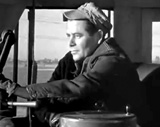 Engineer Jeff Warren (Glenn Ford) 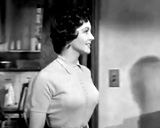 Ellen (Kathleen Case) 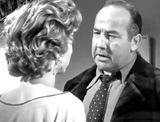 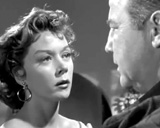 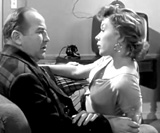 Carl Buckley (Broderick Crawford) with Wife Vicki 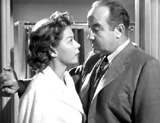 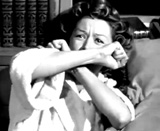 Carl Confronting Vicki About Suspected Adultery with Owens 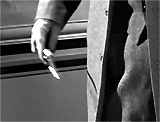 Carl Wiping Blood Off Pocket Knife After Murdering Owens 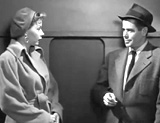 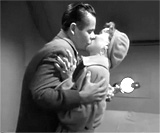 Vicki Distracting Jeff From the Murder Scene on Train 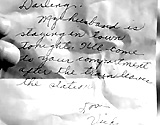 The Incriminating Message Vicki Was Forced to Write to Owens 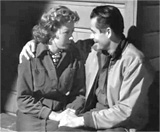 Long, Heart-felt Conversations Between Jeff and Vicki 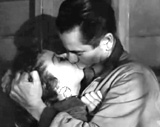 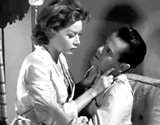 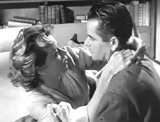 Beginning of Torrid Affair with Jeff 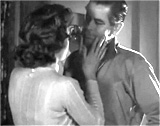 Jeff Tempted to Either Find the Message or Kill Carl 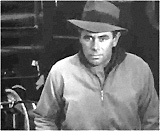 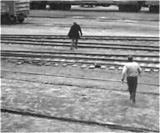 Jeff Stalking Carl 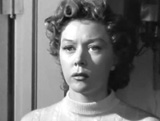 Vicki Stunned that Jeff Didn't Murder Carl 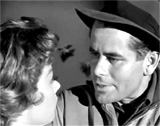 Jeff's Refusal to Do Vicki's Dirty Work By Killing Carl |
||||||||||||||||||||||||||
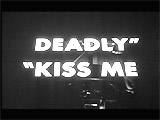
|
Kiss Me Deadly (1955)
Aldrich's suspenseful Cold War Era masterpiece was a jarring and violent crime film that was an adaptation of Mickey Spillane's pulp fiction novel of the same name. It was the definitive, apocalyptic, paranoid, science-fiction film noir of all time - at the close of the classic noir period - although there was no explicit mention of the words bomb, atomic, or thermo-nuclear in the film. It featured inventive camera angles depicting violence and murders during the mid-1950s. The nihilistic independent film featured a cheap and sleazy, mean, contemptible, fascistic, hardened private investigator/vigilante gumshoe named Mike Hammer (Ralph Meeker) whose trademarks were brutish violence, misogyny, the end-justifies-the-means philosophy and speed. The tough PI ruthlessly pursued the white-hot, deadly apocalyptic object in a mysterious 'Pandora's box' ("the great whatzit"), ultimately leading to nuclear catastrophe and annihilation. In the questing tale's startling pre-credits sequence, Hammer was driving late one night toward Los Angeles, when he viewed a pair of naked feet stumbling and running down the middle of a lonely highway at night - a near-hysterical, panting, barely-clothed woman with closely-cropped hair who wore only a white trenchcoat, rasped and breathed heavily on the highly-amplified soundtrack, as she helplessly tried to flag down passing cars that flashed by her. She strategically positioned herself in the middle of the road, by standing and holding her arms out in a V [or crucifixion pose] as Hammer's two-seated, Jaguar sports car/convertible approached and blinded her in its high-beamed headlights. He snarled as he picked up the doomed hitchhiker: "You almost wrecked my car. Well? Get in!" Then came the strangely-presented opening credits - the camera positioned itself behind the two and was pointed toward the windshield and the highway's white line as the most disorienting, skewed, upside-down set of film credits began to scroll. The slanted credits cryptically moved from the top to the bottom of the screen, yet they had to be read backwards from bottom to top. At a roadblock where he faked that she was his wife, he realized she was "a fugitive from the laughing house." During their drive in his sports-car, she claimed that she had been improperly detained at the institution. At a gas station during a quick stop, the female privately asked the attendant to mail a letter for her. [It was later revealed it was mailed to Hammer himself, using his address on the steering column's registration.] On their way again, she quickly sensed Hammer's personality: "You're one of those self-indulgent males who thinks about nothing but his clothes, his car, himself." She identified herself to Hammer as Christina Bailey (Cloris Leachman), and claimed she was named after the poet Christina Rossetti. She gave a description of her name, and some words of warning:
Her last words to Hammer were: "Remember me" (both spoken and mailed in a letter to him after her death). The two were apprehended by villainous thugs in a black car who forced them off the road. In a horrifying sequence while the semi-conscious detective laid on the bed and then on the floor, the mysterious female screamed as she was quickly tortured and killed (gruesomely with pliers semi-off-screen) by the evil pursuers, with only her twitching legs dangling off a table, as an unidentified criminal mastermind with shiny shoes spoke. [Note: The villain was later revealed to be Dr. G.E. Soberin.] He told his underlings that the victim couldn't be brought back from the dead:
Their bodies were placed in Hammer's car before it was pushed off the side of a cliff and burst into flames. Her body was incinerated inside the car, but miraculously, Hammer survived and after three days awakened in his hospital bed without any visible scars or injuries. During his own brutal pursuit of the criminals while recalling her haunting words: "Remember me," Hammer deliberately ignored Christina's advice to "forget you ever saw me" - and didn't give up on an investigation into her demise. Hammer was aided in his search by his sexy and limber, pimping secretary/lover Velda (Maxine Cooper), his 'girl Friday' whose specialty with Hammer was pimping or prostituting herself to frame men for infidelity (divorce case frame-ups). In the Jalisco Hotel during a search for clues, Hammer located Christina's ex-boardinghouse 'roommate' - the real femme fatale of the film. She was 'Lily Carver' (Gaby Rodgers) - a pixieish, waif-like blonde with closely cropped hair wearing a white, terry-cloth bathrobe. She was reclining in bed and had a gun pointed at his crotch when he entered, but she was a deceptive fraud - although Hammer didn't know that until later. The strange young lady duped him with a false name (her actual name was Gabrielle), and she was revealed to be impersonating Christina's roommate Lily Carver - whom she had killed. During his circuitous route to determine clues to Christina's background and secrets, there was a short interlude with a vacuous, amorous, nymphomanaic blonde femme fatale named Friday (Marian Carr) who was poolside in a mobster's Doheny mansion. After kissing him, she purred: "You don't taste like anybody I know." The amorously-inviting Friday also asked: "Will you be my friend?" but he deferred for the time being.
Hammer was soon able to deduce that Christina was a scientist who had a deadly 'secret' regarding a radioactive explosive missing or stolen from the Los Alamos, New Mexico Nuclear Test Site. When Hammer visited Lily a second time, when he found her frightened and hiding on a lower stairwell: "They came last night right after you left. I heard them. I hid in the basement." He sheltered her in his own apartment, where she gave him a thank-you kiss. Hammer spoke to Velda, who knew he was being pursued and asked him: "And who are they? They're the nameless ones who kill people for the great whatzit. Does it exist? Who cares? Everyone everywhere is so involved in the fruitless search for what?" Shortly later, Velda was kidnapped while on her way to a date with a suspicious character known as Dr. Soberin. When he returned home to open Christina's letter mailed to him earlier (with only two words: "REMEMBER ME", he was knocked out by two hoods, and driven to a beach house, where Hammer was tied up and subjected to abuse by a man with blue suede shoes - the aforementioned Dr. Soberin (Albert Dekker), a trafficker in atomic material, and also Christina's torturer. Soberin philosophically advised Hammer to remember - the words asked in Christina's letter, but after an injection of a truth serum, Hammer only rambled incomprehensible phrases and couldn't reveal anything of value to the kidnappers. After escaping from the beach house and returning home, Hammer picked up Lily and proceeded to the morgue where Christina's body was in a drawer. From the coroner after her autopsy, he was able to retrieve a key (labeled H.A.C.) that Christina had swallowed, leading to a locker at the Hollywood Athletic Club, where the 'great whatzit' was found.
It was a leather-bound and strapped outer case with with a metal-lined box inside of it that was filled with nuclear material (loosely identified with "Manhattan project. Los Alamos. Trinity"). A searing white-hot light emanated from within when he briefly opened it - it burned his wrist. Christina had led him to an atomic, 'glowing' box containing the Great Whatsit, and a sinister, deceitful conspirator Dr. Soberin - a trafficker in atomic material produced during the Manhattan Project (in Los Alamos, NM). He was one of the villains who had tortured Christina earlier. Hammer left the case in the locker, and returned to his car, and discovered Lily was missing. After returning home, Hammer was confronted by police who told him that Lily was really an imposter (and possible murderess of Christina's roommate after adopting her name). In the meantime, someone stole the 'great whatsit' from the locker and killed the attendant - viewed dead on the floor as the camera panned to the right in the locker room. Hammer was able to trace Velda's whereabouts to Dr. Soberin's secluded Malibu beach house hideout - the same place where he had been held captive earlier. In the film's controversial, fiery and apocalyptic melt-down climax at Soberin's hideout, both Dr. Soberin and his accomplice/moll Gabrielle/Lily were speaking to each other about the mysterious box, taken from the locker. Intensely curious, she knew the box had value but asked as she caressed its top: "What's in the box?" Dr. Soberin delivered many dire warnings to her, both referring to Pandora's Box and also Lot's wife ("She disobeyed and she was changed into a pillar of salt"). He also affirmed:
She deduced that he was about to betray and ditch her, and felt deceived and double-crossed: "Whatever is in that box - it must be very precious. So many people have died for it." She felt that she was being denied her rightful half of the proceeds from the theft and attempted sale of the 'whatzit' (fissionable material). She threatened him with possessing the "Whatsit" box all for herself, without dividing it: "I'll take it all if - you don't mind." She shot her deceitful boss, and as he died, Soberin sternly warned her about the Pandora's box: "Listen to me, as if I were Cerberus barking with all his heads at the gates of Hell, I will tell you where to take it. But don't, don't open the box." When Hammer burst into the room asking for Velda, the avaricious Gabrielle/Lily was just about to open the box. She greeted him and seductively commanded sexual favors - with a wide smile and her gun:
With the femme fatale's destructive sexuality and promise of the kiss of death (although she never physically kissed Hammer), she fired point-blank into the midsection of the misogynistic hero before he reached her, and he fell to the floor - wounded. Undeterred, disobedient and ignorant, she lifted the leather top from the case of the strapped Pandora's 'whatz-it' box, the film's doomsday McGuffin. She then touched the lid, feeling the heat with her caress. She greedily raised the cover in a quest for knowledge of what was contained within - producing a hissing, hellish, unearthly noise that emanated from its interior as the searing and blinding white-hot light hit her face. She pursued her perverse fascination with the fiery light by lifting the lid even higher. She had unleashed and released the deadly, secret, apocalyptic forces inside, and the box couldn't be closed, as she became a flaring pillar of fire consuming her. As the destructive, white-hot, evil forces were freed, she became a shrieking, human torch. In the aftermath, detective Hammer revived and stirred on the floor, and witnessed Lily's horrible death. He frantically freed the kidnapped Velda and both fled from the house. The brutal finale included the nuclear conflagration of the beach house as the two raced out of the exploding house and stumbled together down the beachfront and into the cooling ocean waters, where they hugged waist-deep in the foaming waves of the ocean. They watched from afar as the house was soon engulfed with a wave of flashes, fireballs, and series of mushroom-cloud explosions. Whether Hammer and his assistant Velda survived or not was not entirely clear when the film abruptly ended - with the superimposed THE END.
|
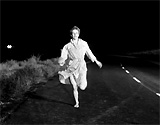 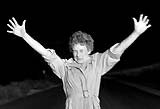 Pre-Credits Sequence  Hammer: "You almost wrecked my car!" 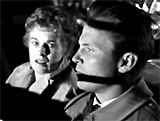 Christina to Hammer: "Remember me" 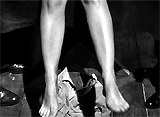 Christina's Torture/Murder 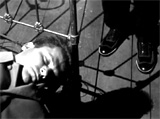 Hammer Unconscious as Christina Was Killed  Hammer's Car With the Two of Them Inside Pushed Off Cliff  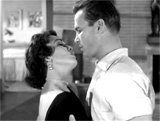 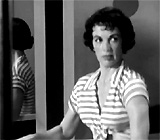 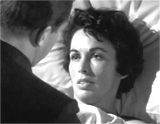 Hammer's Secretary/Lover Velda (Maxine Cooper) Throughout the Film 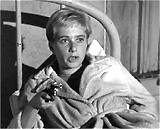 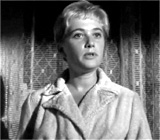 'Lily Carver' (Gaby Rodgers) 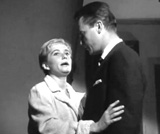 'Lily' In Distress During Hammer's Second Visit 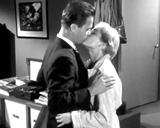 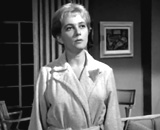 'Lily's' Thank-You Kiss For Hammer in His Apartment  Dr. Soberin's Malibu Beach House Hideout 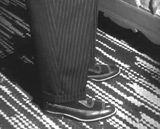 Torturer and Criminal Mastermind Dr. Soberin - Only Identified by Shoes 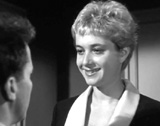 Hammer With Lily Before Driving to the Morgue 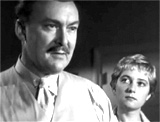 Dr. Soberin with His Accomplice 'Lily' in the Beach House 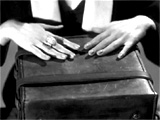 'Lily' Lovingly Caressing the Stolen Box 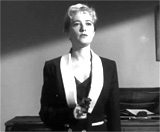 'Lily' Shooting and Murdering Dr. Soberin 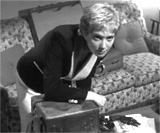 'Lily' About to Open the Box, When Hammer Burst In   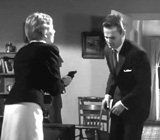 Lily to Hammer: "Come in. Kiss me, Mike" Before Shooting Him |
||||||||||||||||||||||||||
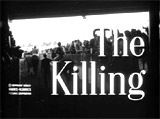
|
The Killing (1956)
This early Stanley Kubrick film-noir crime thriller - the famed director's first major film effort, was similar in tone and theme to The Asphalt Jungle (1950). The black and white heist film, told as an overlapping and interweaving jigsaw puzzle of flashbacks with a mock-documentary narration, was a raw story of greed and infidelity: The film opened with a view of a typical day of horse-racing at the Lansdowne racetrack in the Bay Area. [Note: The track was Bay Meadows in San Mateo, CA.] The main five individuals who were plotting a heist that evening in an apartment at 8 pm were introduced:
Johnny assured his girl Fay about his foolproof plan to make a lot of money: "None of these men are criminals in the usual sense. They've all got jobs, they all live seemingly normal, decent lives, but they got their problems and they've all got a little larceny in 'em." She had been waiting five long years for him and was uncertain about his return to crime, but went along with his statement: "Any time you take a chance, you'd better be sure the rewards are worth the risk." She was insecure about the possibility of him being locked away again if caught, but she believed in him: "I've always believed you, everything you've ever told me....Make sure you're right about it, Johnny. I'm no good for anybody else. I'm not pretty and I'm not very smart, so please don't leave me alone any more." Ultimately, George Peatty was the fatal flaw in the planned heist. He was involved in a troubled five-year marriage with cynical, complaining, domineering, unfaithful, conniving and covetous femme fatale wife Sherry (Marie Windsor). A clue to their unhappiness was revealed when he returned home from work and asked her: "Just tell me one thing. Why did you ever marry me anyway?...You used to love me. You said you did, anyway." She was exasperated that he had promised her riches ("hitting it rich") but nothing had come to fruition. She sarcastically called him "a big handsome intelligent brute." He hinted that he might be coming into a lot of money soon ("hundreds of thousands of dollars...maybe a half million") - piquing her interest in how he would accomplish it: "You don't have enough imagination to lie. So what makes you think or know that you're gonna have several hundred thousand dollars?" - George clammed up, although he added: "You're the one I'm doing it for."
She suggested that she was going out for the evening, while he was out at an undisclosed meeting (planning for the heist). Sherry was able to convince George to divulge his money-making scheme to her (off-screen). The two-timing wife secretly met up that evening with her slick gangster boyfriend/lover Val Cannon (Vince Edwards), who was also two-timing her. She divulged her love of money: "We're gonna have money, Val. More money than you ever dreamed of. Maybe even millions" - and she would get the money via her foolish husband: "He's stumbled onto something big." She guessed that he was somehow connected to the mob and was pulling off a heist: "They're gonna rob the track offices for the day's receipts." Her plan with Val was that they would steal the money from George and his associates after the robbery. Sherry believed that the money would bring her out of poverty and revitalize her life ("And if I just sit tight, I'd be up to my curls in cash, just like that"), and it would allow her to run away with Val.
Johnny's meeting with the other thieves was interrupted when Sherry was found eavesdropping at the door's keyhole. George lied and denied telling her anything, but Johnny harshly asked: "If you didn't tell her then, why was she around here snoopin'?" George made up an excuse for her: "She must have found the address in my pocket. Sure, that's what it was. Thought I was two-timing her, you know, runnin' around with another..." George was forcibly taken home, while Johnny engaged in a shake-down of Sherry, threatening: "I don't think I'll have to kill her. Just slap that pretty face into hamburger meat, that's all." When Sherry corroborated George's excuse, Johnny didn't really believe her - sensing how deceitful, heartless, greedy, unloving and sleazy she truly was:
She agreed to keep quiet and let the heist proceed as planned. Later that evening, Sherry kept it a secret from George what her real motives were. It was entirely implausible that George was chasing after another woman and that Sherry would be jealous of him. Sherry insisted that George, now fearful, not drop out of the plan, since it would mean the loss of the money for her. She counter-balanced her love for him in exchange for the heist, and was able to persuade George to prove his love for her by becoming rich and buying her things:
Three days later and a few days before the heist, Johnny met in a New York City chess club, The Academy of Chess and Checkers, with bald, burly ex-wrestler Maurice Oboukhoff (Kola Kwariani) - a member of Johnny's team of thieves. Maurice thoughtfully told Johnny about his unconventional choice of a life of crime: "You have my sympathies, then. You have not yet learned that in this life you have to be like everyone else - the perfect mediocrity; no better, no worse. Individuality's a monster and it must be strangled in its cradle to make our friends feel confident. You know, I've often thought that the gangster and the artist are the same in the eyes of the masses. They are admired and hero-worshipped, but there is always present underlying wish to see them destroyed at the peak of their glory." The $2 million dollar race-track robbery involved Johnny holding up accountants in the track's back counting room (after being let in by George), while others assisted in getting the money out of the building, and two other crooks created chaos during the race - including two diversionary tactics:
The morning of the heist during an early breakfast, Sherry suspected something was in the works, and again nagged George about their poverty-stricken lifestyle: "It's just I can't stand living like this, in this crummy apartment and a hamburger for dinner." She was encouraged by the fact that they would soon be rich after the robbery: ("Things are gonna be different, you'll see. When we get all that money and we have so many nice things, I'll stop thinking about myself so much"). She pestered him - repeatedly asking him if it was the day of the heist: "It is today, isn't it?" - and realized it was.
The elaborate yet botched and doomed-to-fail $2 million dollar racetrack robbery sequence occurred during the 7th race in the late afternoon. Although the heist went fairly smoothly, sharpshooter Arane was shot and killed by the black parking lot attendant (James Edwards) after downing Red Lightning. All of the surviving gang members were at the rendezvous point in an apartment where they were to split up the money (but Johnny was delayed by traffic). Val barged in to steal their loot with an associate named Tiny (Joe Turkel). When Val taunted George (calling him a "jerk") about how he had heard of the robbery from Sherry ("a certain little lady"), George appeared from a back doorway. After being struck and seriously wounded, George's gun fired wildly in the room multiple times, hitting Val and appearing to also hit some of his compatriots. Val's gun fired once as he went down and also fired into the room. Seriously-wounded George was the only one to survive. Johnny arrived after the massacre to see George stumbling out of the building and driving home. As part of the pre-arranged plan if something went wrong, Johnny was forced to take the money to be split among the others later.
After staggering home, George heard Sherry call him from the back bedroom: "I'm back here, Val darling." He confronted his wife Sherry ("Why did you do it?"), and denounced her for conspiring with Val and planning to run away with him, after she warned: "You'd better get out of here before he gets here." She heartlessly dismissed her husband and refused to help him by calling an ambulance: "Take a cab." Before expiring, George shot her in the abdomen, and as she crumpled over clutching her mid-section, she sputtered:
Likewise, George fell to the floor, dead. Meanwhile, Johnny had crammed the cash into a recently-purchased, cheap large suitcase (but couldn't lock the overstuffed case), and met girlfriend Fay at the airport - with tickets for a flight to Boston. The doomed circumstances of the heist came to fruition when a baggage-cart driver swerved to avoid a poodle-dog on the tarmac, and sent Johnny's checked heavy suitcase of stolen money off the cart onto the runway where it broke open - there was the incredible visual shot of an airplane propeller blowing away the fallen suitcase's contents of banknotes that whirled all over the runway.
In the final scene, authorities were alerted and Johnny was being approached by armed and alerted plainclothes policemen to arrest him as he exited from the airport terminal to hail a cab. He was warned by Fay: ("Johnny, you've got to run!"), but he calmly and futily replied, with the film's tagline: ("Nah, what's the difference?"). |
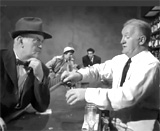 (l to r): Unger and O'Reilly 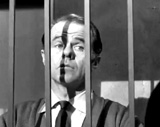 George Peatty (Elisha Cook, Jr.) 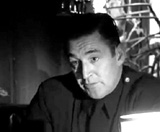 Randy Kennan (Ted DeCorsia) 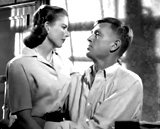 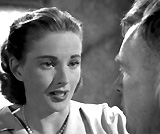 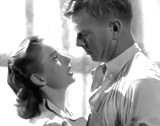 Johnny's Trusting and Loyal Girlfriend Fay (Coleen Gray) 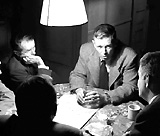 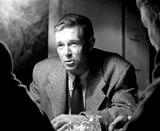 Heist Mastermind Johnny Planning the Theft 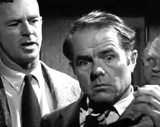 George Surprised that Sherry Was Caught Listening in on Planning Meeting 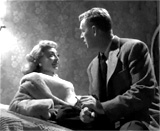 Johnny's Questioning of Eavesdropping Sherry 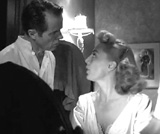 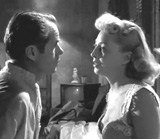 Sherry's Manipulation of George To Steal the Money to Prove His Love For Her 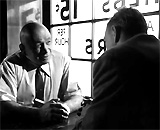 Johnny with Maurice in NYC Chess Club 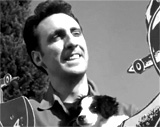 Johnny Negotiating with Sharpshooter Nikki Arane 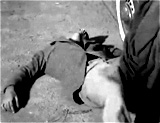 Nikki Shot and Killed by Parking Lot Officer 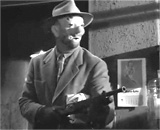 Johnny Disguised With a Rubber Mask During Robbery at Track 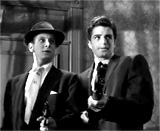 (r to l): Val and Tiny - Robbing the Robbers at the Rendezvous Apartment 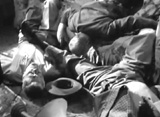 The Massacre in the Apartment 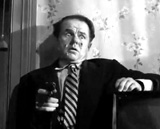 Fatally-Wounded George During Massacre 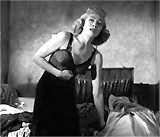 Sherry Crumpled Over and Dying 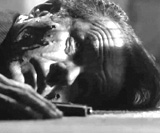 George Dead on the Floor |
||||||||||||||||||||||||||
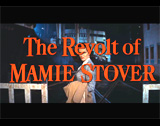
|
The Revolt of Mamie Stover (1956)
Raoul Walsh's 20th Century Fox Cinemascopic, Technicolored, and heavily-censored drama was partly based on the 1951 novel by William Bradford Huie. The lead role was originally intended for Marilyn Monroe, but ended up played by well-stacked Jane Russell. Most of the film's exteriors were filmed on location in Hawaii (Waikiki Beach and environs). The film's main point was to demonstrate how the 'democratized' American culture in wartime allowed a brothel prostitute-hostess to 'revolt' against societal norms and become rich. It was adult-oriented and specifically declared: NOT SUITABLE FOR CHILDREN. The film's tagline asked the film's clearly unanswered (censored) question:
In the film's opening set in San Francisco in 1941, red-headed 26 year-old trashy heroine Mamie Stover (Jane Russell) was escorted from the city and delivered to the SF dock by a SFPD cop (Hugh Beaumont), presumably apprehended for pimping herself as a prostitute - an implied and unstated crime. She had a ticket on a steamer bound for Honolulu. On shipboard, there were only two civilian passengers: Mamie and wealthy and successful science-fiction writer Jim Blair (Richard Egan) (with a portable typewriter) who was returning home. The Captain spoke about her to the writer - with warning signals:
When Mamie overheard "gutter talk" about her, she was miffed, but it wasn't unusual for her. She struck up a shipboard acquaintance on the freighter with Jim. She asked if he ever wrote biographies - he theorized that she was a pretty high-school graduate who had attended Leesburg, MI high school years earlier in 1936, a "Cinderella, but no gown, no coach...The men said she was hot as a smoke-stack...I know all about these shapely Cinderellas with their yearning hearts and what happens to most of them." He also told her: "You’re an interesting character study, Mamie." She noted his story-writing talent, as he wove her into one of his latest sentences: "Having a story written about you is almost as good as being a cover girl." During the voyage, they played ring-toss on deck and shared a few passionate kisses, but remained in separate state-rooms. On their last night together, she told him how she would strive to make it big and become rich on the island. She also shared her employment intentions in Hawaii - to work at a place called the Bungalow with 20 or 30 other girls. When she told him her plans, he was unenthusiastic:
She didn't care, as long as "the money rolls in," and she could return home some day and look down on all the people who thought she was poor 'white trash.' She asked if he would take her up to his "house on the hill" where he lived: "You could dress me up and teach me how to behave." He declined: "You can't be transported to a hill-top by magic, or on the back of somebody else....The answer is no." When the ship arrived at the Honolulu dock, Jim parted from Mamie and gave her a $100 loan for room rent and help in acquiring a job - and she accepted: "Some people can afford to be respectable, but I can't." He was greeted by his refined, pure-bred, good-girl lady friend Annalee Johnson (Joan Leslie in her last feature film) - described as "somebody special" from the "hilltop," and his dutiful manservant Aki (Leon Lontoc).
He was unable to meet her challenge of making a lady out of her when she found employment through connections with her old friend Jackie Davis (Jorja Curtright) as a dance-hall bar hostess (in the 50s, that was a euphemism for 'prostitute') at The Bungalow. The establishment was led and owned by blonde, humorless, butchy, cynical business-woman Madame Bertha Parchman (Agnes Moorehead) and managed by her strong-armed, white-suited Harry Adkins (Michael Pate) with thick glasses - the club's sinister, sadistic and cruel enforcer (and Bertha's lover on the side). Inside the Bungalow with its bar and dance hall, Bertha emphasized: "The Bungalow is a respectable place. We sell drinks and dances and social entertainment." Adkins and Bertha described the four house rules for the 'hostesses' - (they were required to live on the premises, forbidden to have boyfriends or dates on the "outside," were not permitted to go swimming at Waikiki Beach or enter into the hotels, and could not possess a bank account). Girls would earn 30% on whatever they sold to make money. Before the eager male customers were let in, Bertha encouraged her girls: "Sell, sell, sell, whiskey and champagne. Smile it up, you new ladies, smile it up. Remember, smiles means money." GIs met with chosen hostesses in 20 private champagne rooms or suites equipped with a timer, a phonograph record player, a 2-person seating area, and a curtained back-room. At her new place of work, Mamie dyed her hair a bright red color, and was advertised with her adopted nickname: "Flaming Mamie." After Mamie sent back Jim's $100 loan, he visited with her at the club and had to buy $20 worth of tickets to reserve some time with her. She asserted to Jim that her red-top hairdo was good for business: "Sells lots more tickets. They've been calling me flaming Mamie." She was pleased when Jim agreed to meet with her outside the club the next day, although her relationship with him would become risky. She was tarnished by her disreputable occupation - and the many prohibitions against her profession at the time. When Mamie met with Jim outside the club for a second visit, she fanned a wad of bills at him amounting to $2,200 dollars, and boasted that she was averaging $40-50 dollars a night with her customers. Her ambition was to become rich and she wasn't ready to leave town and return home quite yet. Sharing a beachside picnic lunch and swim within view of Diamond Head in the far distance, she requested that Jim send a $200 check for her to her father to impress him - and overcame his resistance to keeping her money in a safe deposit box by kissing him.
During a third visit between them at his home on the hill, Jim realized that she had made it look like they were married as a ruse, pretending to be Mr. and Mrs. Jim Blair. She gave Jim a lame excuse: "I had to give my old man some explanation about why I left San Francisco. Well, I’ve been leavin’ too many cities lately. I wanted to keep him hopin', Jimmy. So I told him that I was married to some guy with a lot of money, and that he could keep braggin' me up downtown about how he was gonna buy him a house, and you know, servants and mint julips." She was very impressed by his home on the hill. Rather than stay on the island with her reputation, he encouraged her instead to return home and impress everyone with her newfound wealth: "Take it and go home in style. Make the biggest splash in the town’s history." She had other ideas, and was bound to demonstrate that she could combat prejudices against herself and become rich there - her overriding objective in life - so that she could live like so many other upper-class, quality people: "I'm gonna live in a house just like this, maybe even bigger. You just wait and see. Jimmy, with enough money, you can buy anything!" The opportunistic Mamie predicted that she could become an avaricious war profiteer (something detested by Jim: "There are dirty names for people like that"). She responded that she was familiar with abusive names: "I'm used to dirty names." He was fed up with being her "caretaker" for her bank account, and her incessant talk and obsession about making money: ("What kind of a yardstick is that? Don't you ever get sick of measuring everything, every human emotion, in terms of money?"). She reminded him of her poor upbringing as a have-not: "I was born with nothing, and was raised on lots more of the same." He apologized to her for being overly opinionated - and they hugged and kissed. The two ran into conflict when her menacing boss Harry Adkins observed her returning to the Bungalow and being dropped off (with a kiss from Jim). He suspected that she was illegally dating - against house rules - and beat up Mamie (off-screen) in her room. At the end of 1941 when a bombing attack on Pearl Harbor occurred, the panic sent islanders fleeing from their homes to seek shelter. Mamie realized that her dream of wealth might come to fruition: ("They’re all running scared, gettin' out, but not me. I'm gonna buy real estate with every dollar I can raise!"). Jim's first inclination was to race to Mamie's rescue in the Bungalow, where he told her that he was planning to enlist in the Marines. While Jim was being trained for combat, Mamie immediately began to buy cheap real estate (with her saved-up cash) from those who were fleeing to the mainland and selling their properties for fear of a Japanese invasion. On a day pass before shipping out the next day, Jim invited Mamie to his place where she divulged that she had formed a real estate corporation in her name (STOMAM), to begin making a profit by renting out her acquired properties and land to the US government for needed military use. To celebrate with a special evening together before he shipped out, Jim reserved a table-for-two at the outdoor ocean-side Diamond Head terrace at the Halekulani Hotel (an exclusive Waikiki resort), for dinner and dancing. Mamie's lifestyle conflicted with Jim's more conventional standards (and some looked at them with disapproval), but he had fallen in love with Mamie anyway ("You're the lady in this crowd, Cinderella"). They were interrupted when Adkins (Jim called him a "cockroach") saw the couple dining at the exclusive Waikiki resort, and Jim engaged him in a fight. When the military police became involved, they realized Adkins was about to assault a female Bungalow employee. Adkins was hauled off after he insulted Mamie and called her "a tramp and she's on the wrong side of town." Mamie was impressed by Jim's defense of her although she realized the odds were against them: "You can’t lick the whole island, Jimmy. I got a number on my back and they all know it." To her surprise, Jim announced to her: "There aren’t going to be any more numbers on your back. You're quitting Bertha's tonight. I love you, Mamie. Not just in private, but anywhere and everywhere." At first she declined: "You mustn't ruin your life for me," but then he proposed marriage to her - after he had served his time in the 110th Infantry ("The world's a big place, with lots of room for us, but no more Bertha's"). He wanted her 'exclusively' for himself. She accepted his proposal and promised to leave The Bungalow that evening. She gushed: "I'm so crazy, dopey, happy. This just can't be happening to me, not to me!" She accepted his ring as he told her: "This makes it legal," before he entered the military grounds to begin service. Meanwhile, Bertha fired Harry after five years of service for endangering the Bungalow's longevity: ("I can't afford to have trouble with the military police. Once I'm placed off-limits, it's goodbye Bungalow"). With Harry out of the way and Jim off at war, Madame Bertha proposed: "Mamie, I'm gonna build you into the biggest thing this business ever saw. And I'm boosting your cut to 35%." Mamie was determined to still quit and prove herself on her own, via the love of a quality man: "I'm gonna prove you can be something you're not supposed to be." However, she was thoroughly tempted to ignore her man's 'exclusivity' contract and promise of marriage after the war, when Bertha argued that she could get Mamie a respectable mailing address, and have her become rich by making Mamie the dance-hall's star who would share 50% of the profits: "Show me a guy who ever objected to a dowry." Mamie accepted, while deceiving and lying to Jim about quitting and leaving the Bungalow. GIs were lined up outside the Bungalow and extended around the block. The minimum ticket purchase was now $3.00, but the establishment was threatened with being closed for overcharging servicemen. Mamie used her seductive charms to sweet-talk and mollify MP Captain Eldon Sumac (Richard Coogan) and for a short while had a relationship on the side with the married man. In a sexy gown, Mamie performed a sensual version of "Keep Your Eyes On the Hands" - instructions for hula watchers. She also pressured Bertha to raise her share to 70%, while receiving $4,000 a month from her rentals. Jim learned about her duplicity when he saw a photo of her life-sized six-foot pin-up poster, promoting her as a star attraction around the time of the Battle of Midway in mid-1942. After suffering a shoulder injury from a bombing, Jim returned for a short furlough to Hawaii to recuperate, and visited with Mamie at the Bungalow. Her continuing ambitions as a successful "working girl" - with wealth and social status - ultimately doomed their happiness (even though his claims really held no weight since she wasn't a hooker on the side, according to the sanitized film). She apologized and insisted they'd go away. She begged for them to start all over again, but it didn't matter to Jim, who summarized their world of differences - he was against her efforts to be ambitious, to get ahead and be rich, and to break society's norms and conventions:
After he abandoned her with no hard feelings, Mamie coldly told him that she had already achieved her goal of respectability: "Your time's up, mister. I don't need to get to the hilltop on anybody else's back. I'm there now, on the highest hill in the island in the biggest house." She removed his ring, and then began to sob, before a fade-out to black. There was an abrupt transition to the short epilogue - Mamie (now a brunette) disembarked in San Francisco, in a financial situation similar to the one when she left the city. She was told again by the same policeman on the dock that she was not welcome: ("Mamie, nothing's changed, Mamie. You're still not welcome in San Francisco"). She told him that she was just temporarily passing through on her way to her hometown of Leesburg, Mississippi. He told her that she looked like she hadn't done very well in Honolulu. She suggested that she had made a fortune but lost it: "If I'd told you that I'd made a fortune and given it all away, would you believe me?" - (punishment via the cruel dictates of the Production Code) - but he didn't believe her. She was driven in the police squad car to the airport for her return flight home. |
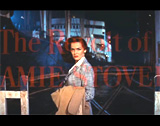 Mamie (Jane Russell) Escorted by Police to the SF Dock 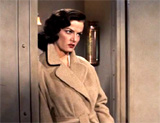 Mamie Stover on Board Freighter to Hawaii - Overhearing Gutter Talk About Her 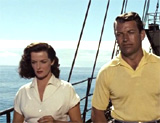 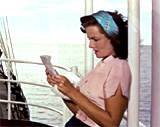 Mamie's Acquaintance With Writer Jim Blair (Richard Egan) 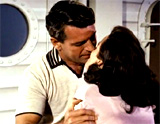 Jim's Passionate Set of Kisses with Mamie On-Deck 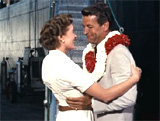 Arrival in Honolulu - Jim Greeted by Girlfriend Annalee (Joan Leslie) 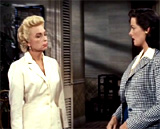 Mamie Inspected and Approved at the Bungalow by Madame Bertha Parchman (Agnes Moorehead) 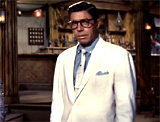 The Rules Enforced by Bouncer Harry Adkins (Michael Pate) 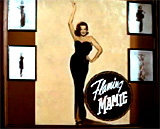 The Newest Attraction - "Flaming Mamie" 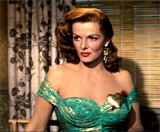 Mamie - One of the Most Popular Hostesses 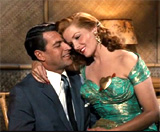 Mamie With Jim During His Visit to Club 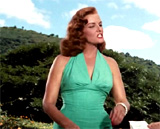 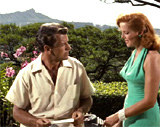 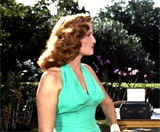 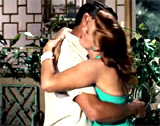 3rd Visit At Jim's Home on Hill 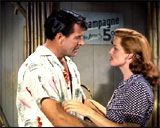 After the Pearl Harbor Attack, Jim's Decision to Enlist 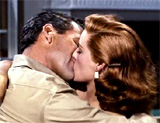 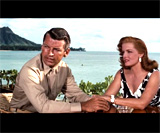 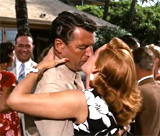 Falling in Love - Although Disapproved Of 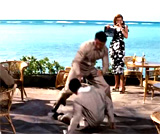 Jim's and Mamie's Confrontation with Adkins 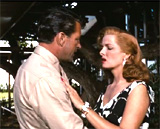 Jim's Marriage Proposal to Mamie 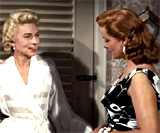 Mamie Breaking Her Promise to Jim - A Deal with Bertha For 50% of the Profits 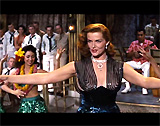 "Keep Your Eyes on the Hands" 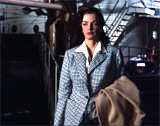 A Return to SF Enroute to Mississippi |
||||||||||||||||||||||||||